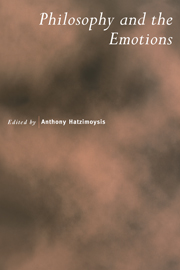Book contents
- Frontmatter
- Contents
- Preface
- Notes on Contributors
- I Emotions, Thoughts and Feelings: What is a ‘Cognitive Theory’ of the Emotions and Does it Neglect Affectivity?
- II The Emotions and their Philosophy of Mind
- III Basic Emotions, Complex Emotions, Machiavellian Emotions
- IV Emotion, Psychosemantics, and Embodied Appraisals
- V Emotions and the Problem of Other Minds
- VI Emotional Feelings and Intentionalism
- VII Emotions, Rationality, and Mind/Body
- VIII The significance of recalcitrant emotion (or, anti-quasijudgmentalism)
- IX The Logic of Emotions
- X Emotion and Desire in Self-Deception
- XI Emotion, Weakness of Will, and the Normative Conception of Agency
- XII Narrative and Perspective; Values and Appropriate Emotions
- XIII Passion and Politics
- XIV Don't Worry, Feel Guilty
- Index
VI - Emotional Feelings and Intentionalism
Published online by Cambridge University Press: 06 January 2010
- Frontmatter
- Contents
- Preface
- Notes on Contributors
- I Emotions, Thoughts and Feelings: What is a ‘Cognitive Theory’ of the Emotions and Does it Neglect Affectivity?
- II The Emotions and their Philosophy of Mind
- III Basic Emotions, Complex Emotions, Machiavellian Emotions
- IV Emotion, Psychosemantics, and Embodied Appraisals
- V Emotions and the Problem of Other Minds
- VI Emotional Feelings and Intentionalism
- VII Emotions, Rationality, and Mind/Body
- VIII The significance of recalcitrant emotion (or, anti-quasijudgmentalism)
- IX The Logic of Emotions
- X Emotion and Desire in Self-Deception
- XI Emotion, Weakness of Will, and the Normative Conception of Agency
- XII Narrative and Perspective; Values and Appropriate Emotions
- XIII Passion and Politics
- XIV Don't Worry, Feel Guilty
- Index
Summary
Emotions are Janus-faced: their focus may switch from how a person is feeling deep inside her, to the busy world of actions, words, or gestures whose perception currently affects her. The intimate relation between the ‘inside’ and the ‘outside’ seems to call for a redrawing of the traditional distinction of mental states between those that can look out to the world, and those that are, supposedly, irredeemably blind.
The phenomenology of emotional experience—(an account of) what it is like for a subject to experience an emotion—invites the question of whether we can articulate a theory of emotional feeling that could justify the claim that emotions are states in which the world is presented to the subject. That claim has been prominent in recent theories of emotion, and its importance is hard to overstate. If true, the claim that emotions are akin to perceptual states would fit nicely, and, thus, lend support to the view that emotions reveal to us a world of comforting, frightening, loveable, or unbearable persons, events and states of affairs. If emotions are indeed perceptions, and if at least some of those perceptions are not illusory, then what they attend to is real. The focus of emotion is those aspects of reality that have significance, import, a positive or negative value for us. The conclusion that could be drawn from this approach is that the world we encounter is enchanted or meaningful, or, more prosaically, that prudential, moral or aesthetic values are real.
- Type
- Chapter
- Information
- Philosophy and the Emotions , pp. 105 - 112Publisher: Cambridge University PressPrint publication year: 2003
- 7
- Cited by

